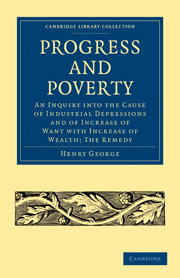 Progress and Poverty
Progress and Poverty Book contents
- Frontmatter
- PREFACE TO FOURTH EDITION
- Contents
- INTRODUCTORY
- BOOK I WAGES AND CAPITAL
- BOOK II POPULATION AND SUBSISTENCE
- BOOK III THE LAWS OF DISTRIBUTION
- BOOK IV EFFECT OF MATERIAL PROGRESS UPON THE DISTRIBUTION OF WEALTH
- BOOK V THE PROBLEM SOLVED
- BOOK VI THE REMEDY
- BOOK VII JUSTICE OF THE REMEDY
- Chapter I Injustice of private property in land
- Chapter II Enslavement of laborers the ultimate result of private property in land
- Chapter III Claim of land owners to compsnsation
- Chapter IV Property in land historically considered
- Chapter V Property in land in the United States
- BOOK VIII APPLICATION OF THE REMEDY
- BOOK IX EFFECTS OF THE REMEDY
- BOOK X THE LAW OF HUMAN PROGRESS
- CONCLUSION
- INDEX
Chapter II - Enslavement of laborers the ultimate result of private property in land
Published online by Cambridge University Press: 07 September 2011
- Frontmatter
- PREFACE TO FOURTH EDITION
- Contents
- INTRODUCTORY
- BOOK I WAGES AND CAPITAL
- BOOK II POPULATION AND SUBSISTENCE
- BOOK III THE LAWS OF DISTRIBUTION
- BOOK IV EFFECT OF MATERIAL PROGRESS UPON THE DISTRIBUTION OF WEALTH
- BOOK V THE PROBLEM SOLVED
- BOOK VI THE REMEDY
- BOOK VII JUSTICE OF THE REMEDY
- Chapter I Injustice of private property in land
- Chapter II Enslavement of laborers the ultimate result of private property in land
- Chapter III Claim of land owners to compsnsation
- Chapter IV Property in land historically considered
- Chapter V Property in land in the United States
- BOOK VIII APPLICATION OF THE REMEDY
- BOOK IX EFFECTS OF THE REMEDY
- BOOK X THE LAW OF HUMAN PROGRESS
- CONCLUSION
- INDEX
Summary
If chattel slavery be unjust, then is private property in land unjust.
For, let the circumstances be what they may—the ownership of land will always give the ownership of men, to a degree measured by the necessity (real or artificial) for the use of land. This is but a statement in different form of the law of rent.
And when that necessity is absolute—when starvation is the alternative to the use of land, then does the ownership of men involved in the ownership of land become absolute.
Place one hundred men on an island from which there is no escape, and whether you make one of these men the absolute owner of the other ninety-nine, or the absolute owner of the soil of the island will make no difference either to him or to them.
In the one case, as the other, the one will be the absolute master of the ninety-nine—his power extending even to life and death, for simply to refuse them permission to live upon the island would be to force them into the sea.
Upon a larger scale, and through more complex relations, the same cause must operate in the same way and to the same end—the ultimate result, the enslavement of laborers, becoming apparent just as the pressure increases which compels them to live on and from land which is treated as the exclusive property of others.
- Type
- Chapter
- Information
- Progress and PovertyAn Inquiry into the Cause of Industrial Depressions and of Increase of Want with Increase of Wealth; The Remedy, pp. 312 - 321Publisher: Cambridge University PressPrint publication year: 2009First published in: 1881
